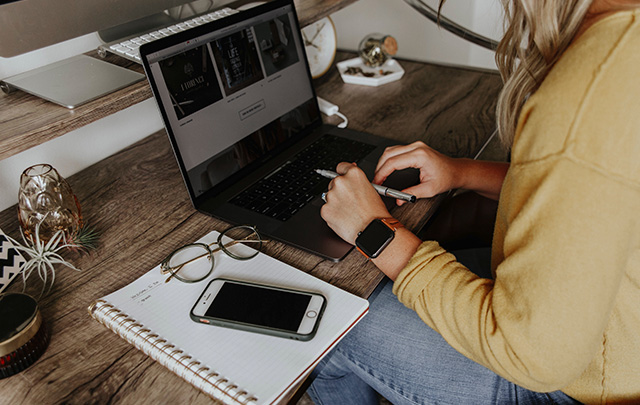This week has been Mental Health Awareness Week, and the theme has been “Together we can tackle Loneliness”. We’ve therefore been looking in to the impact of loneliness on our mental health and the practical steps we can take to address it. This issue has become more prevalent since the pandemic, where many businesses have moved to a hybrid working model which involves regular working from home. Something that was not even considered in most workplaces 2 years ago, this has now become our norm.
Some people love working from home. Others find it a struggle. This is often down to the fact that our WFH environments vary wildly – and it can be incredibly isolating. Feeling lonely is a big issue for one in four adults in the UK.¹ And the longer we feel lonely, the more significant of an impact this can have on our mental health.
During our Wellbeing Week in March, the effects of working from home was a topic we discussed. We asked our staff to pledge to do one of these things to improve their general mental health and assess if it helped them to feel better, clearer headed, and focussed. The feedback we received was really positive. Check out some of the tips below:
- Follow a routine. Simple things like making your bed, tidying your work space ready for the day, having a shower, and getting into comfortable, clean clothes and eating a healthy breakfast will help to set you up for the day.
- “Commute” to work. Do you have a local coffee shop or park you can walk to? Or simply walk around the block. Pick up a hot drink or take one with you – go for a 10-20 minute walk before you start your day. This helps to break up the line between “home” and “work”. If you have a dog, this might already be a part of your daily routine.
- Organise your workspace effectively. Make sure you are creating a space which is productive to work in. Think about how much lighting you have, the desk you’re working at. Are you utilising your laptop accessories so that you don’t get neck pain? Some of that induced stress impacts our bodies in different ways, especially as you’re sitting. Some people are working on sofas and a laptop on their laps because they don’t have a set office space. Can you find a chair with adequate back support? Try to create better environments for you to work effectively as well as looking after your body.
- Take regular breaks to help you focus. This is an important one, and one we’re all guilty of forgetting. How often have you sat down to work, and suddenly realised that it’s nearly lunchtime? “Where has the day gone?” Give yourself permission to take breaks, invite movement into your breaks, go for a walk, have a stretch, roll your shoulders, make a hot drink, fuss over a pet. It’s recommended that when looking at laptop screens, we take breaks every 45 minutes – even if it’s just for 5-10 minutes.
- Cut down your screen time. When you’re taking your breaks, try to minimise the amount of time you’re looking at your phone.
We also asked the team for their top tips and what they do when they’re feeling lonely:
- Feeling lonely is not a nice feeling but remember that there is solace to be found in being alone – are you lonely or uncomfortable in your own company? There’s nothing wrong with it, and sometimes it should be embraced. Take some time out to pamper yourself; have a bath, listen to your favourite music or e-book.
- Communicating how you feel to someone close to you. Picking up the phone to someone you haven’t spoken to in a while. Reaching out to a charity like Samaritans if you are really struggling to confide in someone you know. It’s free, and their volunteers are trained to help people who are struggling with their mental health. Voicing how you feel, out loud, to another human being, is a huge step to help you feel better.
- Doing some exercise. Going for a walk, run, or doing an online exercise class always helps when I’m feeling low. It’s a great endorphin boost and helps you to get out of your head.
- Social media is another culprit of making us feel lonely – it gives the false perception that everyone else is living their best lives, without seeing what’s happening under the surface. Take stock of your thoughts when you’re scrolling – and notice if you’re getting FOMO and feeling negative thoughts. It might be a good idea to take a social media break.
- Listening to a podcast can be a great way to unwind as well as reduce your screen time. There are so many podcasts out there covering such a range of topics, that no matter what you’re in the mood for you can find something. One of my personal favourites, and very apt for this weeks topic, is ‘Dive Deep, Climb High’ by Mel Loizou. One of her most recent episodes was on ‘Workplace Wellbeing’ and I felt it was a really insightful discussion with some great takeaways. You can listen to it here.
Additional Resources
Check out this fantastic article about Loneliness by Megan Bruneau, a qualified psychotherapist and executive coach – she provides some excellent advice for people experiencing loneliness and how to combat it.
Unitemps – Working from home tips
NHS – Simple tips to tackle working from home
If you’d like to discuss any of the above points further, you can reach out to one of our Mental Health First Aiders who would be happy to share their thoughts: Alison Shine, Emilia Fasano & Rob Cullum.
